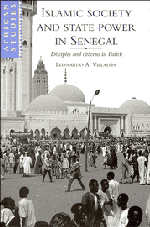Book contents
- Frontmatter
- Contents
- List of tables
- Acknowledgments
- A note on spelling
- Glossary
- Map of Senegal
- Introduction: good Africans, good citizens, good Muslims
- 1 Islam in the politics of state–society relations
- 2 The structure of society: Fatick in the Senegalese context
- 3 The state–citizen relationship: struggle over bridges
- 4 The marabout–disciple relationship I: foundations of recruiting and following
- 5 The marabout–disciple relationship II: the structures of allegiance
- 6 The state–marabout relationship: collaboration, conflict, and alternatives
- 7 Bureaucrats, marabouts, and citizen–disciples: how precarious a balance?
- Notes
- Select bibliography
- Index
- Titles in the series
4 - The marabout–disciple relationship I: foundations of recruiting and following
Published online by Cambridge University Press: 10 November 2009
- Frontmatter
- Contents
- List of tables
- Acknowledgments
- A note on spelling
- Glossary
- Map of Senegal
- Introduction: good Africans, good citizens, good Muslims
- 1 Islam in the politics of state–society relations
- 2 The structure of society: Fatick in the Senegalese context
- 3 The state–citizen relationship: struggle over bridges
- 4 The marabout–disciple relationship I: foundations of recruiting and following
- 5 The marabout–disciple relationship II: the structures of allegiance
- 6 The state–marabout relationship: collaboration, conflict, and alternatives
- 7 Bureaucrats, marabouts, and citizen–disciples: how precarious a balance?
- Notes
- Select bibliography
- Index
- Titles in the series
Summary
Central to an understanding of the organization of the Sufi orders, and hence to the political impact of Islam in Senegal, is the question of the nature of the ties that bind Sufi religious leaders, the marabouts, and their disciples, or taalibes. As I noted briefly in chapter 2, the preeminent aspect of the orders in their Senegalese manifestation involves a relationship of dependence between marabouts and their disciples. There exists, therefore, an evident potential for the marabouts, and particularly the most important ones who command large followings, to play a leading role in the Senegalese political system. Relations between the state and the marabouts have consequently attracted the attention of virtually every student of Senegal. While such attention is certainly warranted, a full explanation of the patterns of interaction between state and religious elites hinges ultimately on the extent of control or leverage which the marabouts can, in fact, exercise over their followers. Yet despite its importance this issue has received relatively little attention in research on Senegal – with the important exception of the case of the Mouride order in its rural agricultural setting. This chapter and the one that follows, therefore, examine comparatively the nature of those ties across Sufi orders at the grassroots level.
Discussing the relationship first from the popular perspective, I find that the high degree of stability in the attachment of individuals to specific marabouts or to an order has not been translated into any significant degree of rigidity in these relationships.
- Type
- Chapter
- Information
- Islamic Society and State Power in SenegalDisciples and Citizens in Fatick, pp. 115 - 148Publisher: Cambridge University PressPrint publication year: 1995



